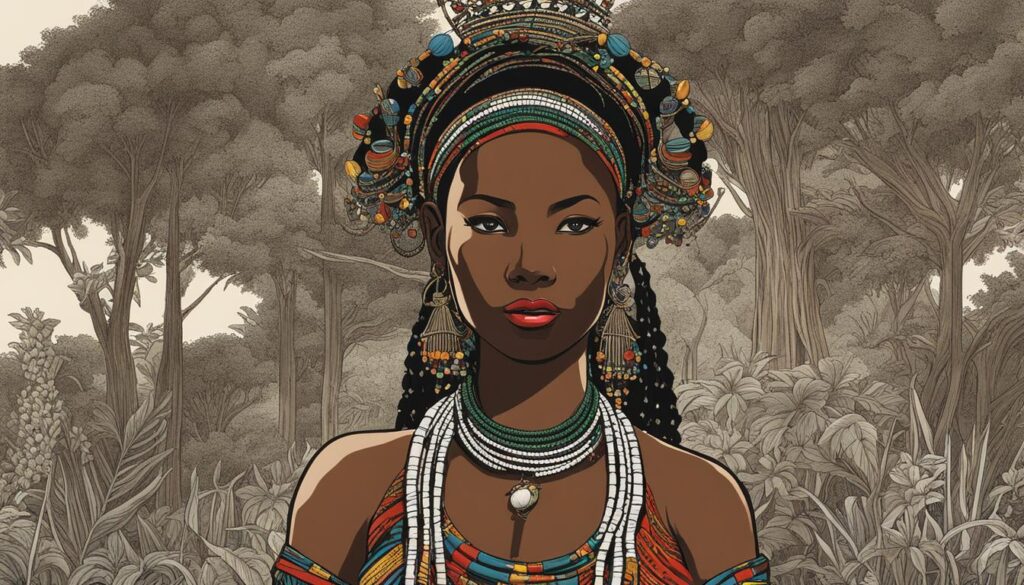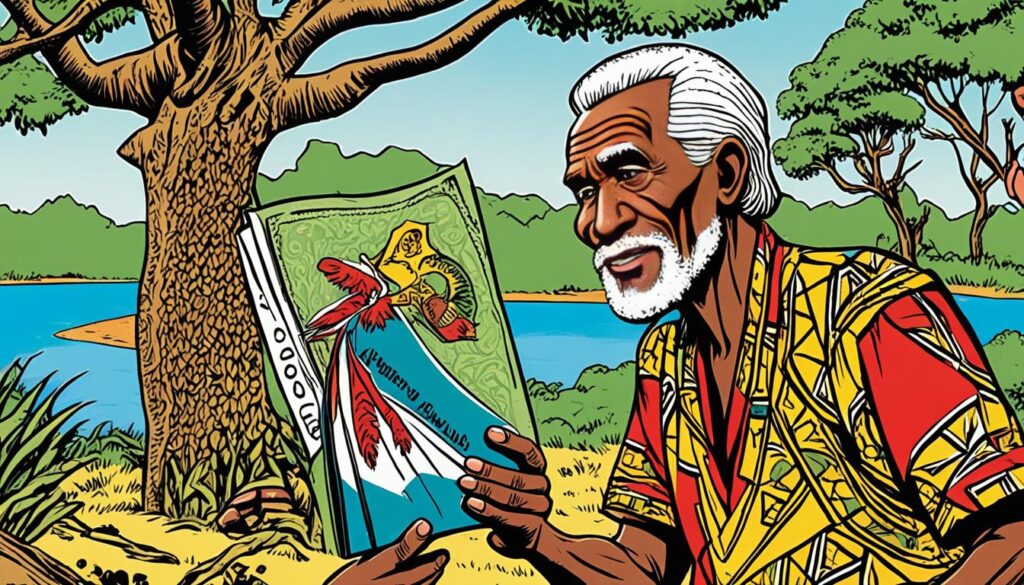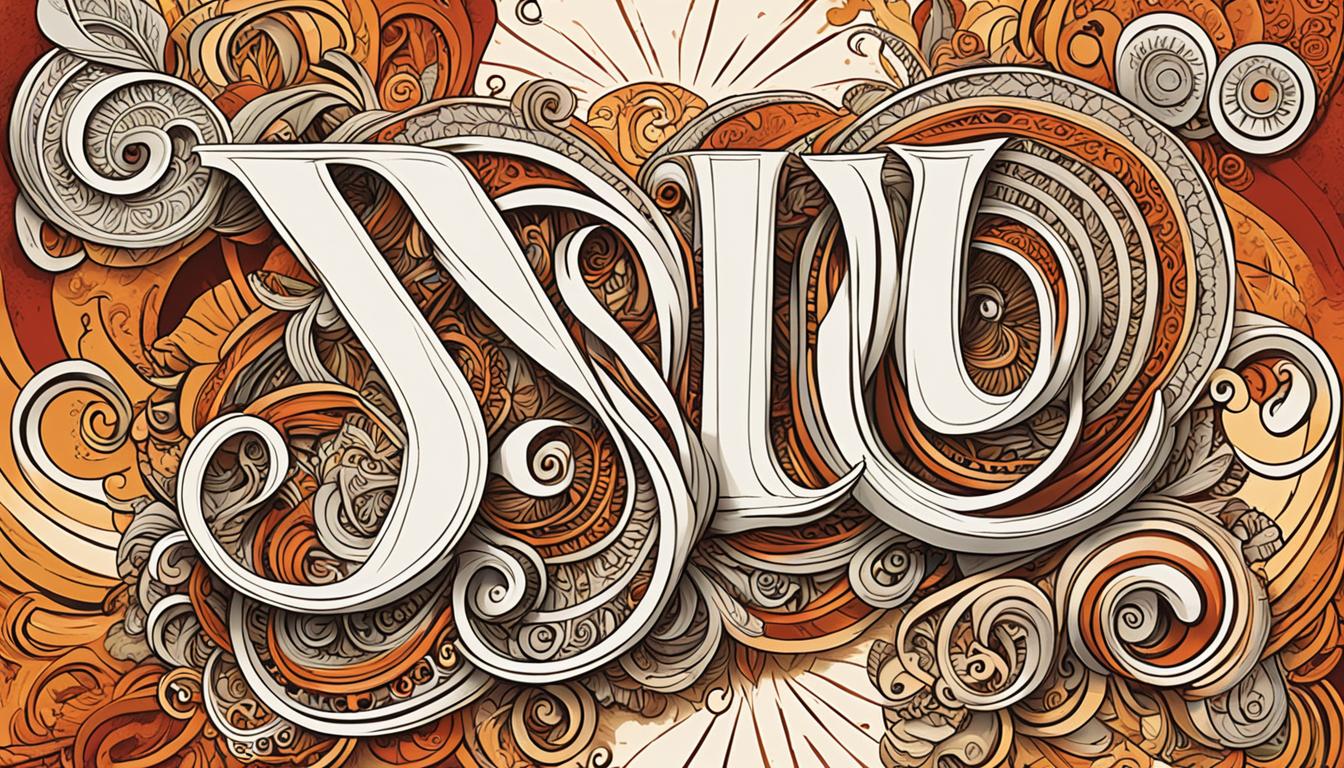Did you know that over 2.4 million people in central Mozambique and southeastern Zimbabwe speak Ndau, a unique Bantu language with its own dialect and cultural heritage? Ndau is officially recognized as a language in Zimbabwe and has a fascinating history and significance among the Ndau people.
The History and Origins of Ndau Language
The Ndau people have a rich historical background and their language, Ndau, holds significant origins within Eastern Zimbabwe. The Ndau language is a distinct Eastern Zimbabwe language, historically related to the Karanga tribe. It has developed over time through intermarriage with the Nguni tribe and has been influenced by neighboring languages.
It is believed that the name “Ndau” derives from the Nguni words meaning “those looking for a place.” This language has deep roots that can be traced back to the 1500s, where the Ndau people established a long-standing presence in Mozambique and certain parts of Zimbabwe.
The Ndau language has branched out into various dialects, with one such dialect being the Ndawura dialect. These dialects provide glimpses into the diverse linguistic landscape of the Ndau people and their cultural heritage.
“The Ndau language is an Eastern Zimbabwe language that is historically related to the Karanga tribe. It has evolved through intermarriage with the Nguni tribe and bears influences from neighboring languages.”
To better understand the significance of Ndau language and its cultural roots, it is important to delve deeper into Ndau language and culture.
Ndau Language and Culture
The Ndau language is an integral part of the vibrant culture of the Ndau people. With a strong connection to their ancestral spirits, the Ndau community relies on them for guidance and protection. This deep spiritual bond shapes their beliefs, practices, and way of life. Ndau culture encompasses a range of traditional customs, including herbalism and black magic, which play significant roles in their daily routines.
The Ndau people, belonging to the broader Shona group, possess a unique cultural identity that distinguishes them from other communities. Their rich heritage and contributions to the cultural diversity of Mozambique and Zimbabwe deserve recognition and appreciation. Through their language and cultural practices, the Ndau people preserve their traditions and pass them down to future generations.
In the Ndau community, language serves as a powerful tool for cultural expression and communication. The Ndau dialect, specific to their community, conveys their distinct history, beliefs, and values. It reflects the collective identity of the Ndau people and represents a key aspect of their cultural heritage.
“Language is the road map of a culture. It tells you where its people come from and where they are going.” – Rita Mae Brown
By preserving their language and cultural traditions, the Ndau people maintain a strong sense of identity and pride. Language serves as a link between generations, connecting past, present, and future. Through language, the Ndau people reaffirm their roots and continue to contribute to the diverse tapestry of Mozambique and Zimbabwe.
The Influence of Ndau Culture
The Ndau culture has far-reaching impacts beyond the boundaries of their community. It embodies the wisdom, resilience, and creativity of the Ndau people, showcasing their capacity for innovation and adaptation. The cultural practices, storytelling, music, and dances of the Ndau community captivate audiences and foster an appreciation for their unique heritage.
Furthermore, Ndau cultural practices, such as traditional medicine and herbalism, hold valuable knowledge about the healing properties of local plants and remedies. This indigenous knowledge has the potential to inform modern medical practices and contribute to advancements in healthcare.
The Cultural Significance of Ndau Language
The Ndau language not only shapes the cultural fabric of the Ndau people but also serves as a pillar of their collective memory. It carries the stories, traditions, and wisdom of generations, ensuring the transmission of cultural knowledge from one era to the next. The Ndau language is a living testament to the resilience and heritage of the Ndau community.
Through language, the Ndau people express their hopes, dreams, and aspirations. It serves as an artistic medium for poetry, storytelling, and song. By embracing and promoting their language, the Ndau people celebrate their identity and build bridges of understanding with other communities.

| Practice | Description |
|---|---|
| Herbalism | The use of plants and natural remedies for healing purposes. |
| Black Magic | Traditional practices involving spells, rituals, and supernatural elements. |
| Storytelling | Oral tradition of passing down historical, cultural, and moral stories. |
| Dances | Expressive movements accompanied by music, conveying cultural narratives. |
| Music | Rhythmic melodies, songs, and instruments that reflect Ndau traditions. |
Ndau Language in Contemporary Society
The Ndau language continues to thrive and be spoken by a significant number of people in both Mozambique and Zimbabwe. In Zimbabwe, it holds a prominent position in the Chipinge and Chimanimani districts, while also being spoken in parts of central Mozambique.
The Ndau people have made notable contributions to various sectors, including politics and literature, further emphasizing the importance and influence of the Ndau language within their cultural heritage. By preserving and promoting the Ndau language, the Ndau community ensures the continuation of their rich linguistic traditions.
Cultural Contributions
The Ndau people have a strong cultural identity that is closely tied to the Ndau language. Their contributions extend beyond their native language, influencing the broader cultural landscape of Zimbabwe. With their distinct language and customs, the Ndau people have enriched the nation’s diverse tapestry.
The Ndau people’s cultural influence is not only seen in their language but also in their traditional practices and way of life. Their unique heritage plays a crucial role in shaping the cultural landscape of Zimbabwe.
Moreover, the Ndau language has played a significant role in shaping the literary tradition of the Ndau people. Writers and poets have used the language as a medium for expressing their ideas, emotions, and reflections on the Ndau culture and society.
The Shanga Dialect
Within the Ndau language, there exists a distinct dialect known as the Shanga dialect. This dialect is primarily spoken by the Shanga people, who are part of the Ndau community. The Shanga dialect encompasses its own unique vocabulary, pronunciation, and grammatical structure.
The Shanga dialect is an integral part of the Ndau linguistic landscape. It further highlights the linguistic diversity among the Ndau people while reinforcing their cultural distinctiveness.
| Zimbabwe Districts | Languages Spoken |
|---|---|
| Chipinge | Ndau (including Shanga dialect) |
| Chimanimani | Ndau (including Shanga dialect) |
| Central Mozambique | Ndau (including Shanga dialect) |
In these districts, the Ndau language, including the Shanga dialect, remains a vibrant part of everyday life, serving as a means of communication and cultural expression.
Challenges and Opportunities for Preserving Ndau Language
Preserving and reviving indigenous languages such as Ndau is essential to safeguarding cultural diversity and heritage. However, the Ndau language faces various challenges in its preservation and revitalization efforts.
One of the major hurdles is the impact of globalization and urbanization. As people migrate to urban areas and embrace dominant languages, there is a risk of the Ndau language losing speakers and becoming marginalized. The influence of global media and communication platforms also contributes to the dominance of major languages, further endangering the survival of smaller indigenous languages like Ndau.
In addition to external pressures, internal factors also pose challenges. Limited resources and institutional support for language preservation initiatives can hinder progress. The lack of standardized orthography and linguistic documentation can make it difficult to preserve and teach the Ndau language effectively.
Despite these challenges, there are opportunities for promoting and preserving the Ndau language. Education programs that incorporate Ndau language instruction can play a crucial role in revitalization efforts. By integrating Ndau into school curricula, young generations can develop proficiency in their mother tongue and gain a deeper appreciation for their cultural heritage.
Cultural events and community gatherings also provide platforms for celebrating the Ndau language and encouraging its use. Festivals, cultural exhibitions, and language-focused workshops create opportunities for Ndau speakers to come together, exchange knowledge, and transmit the language to younger generations.
“Preserving the Ndau language is a collective responsibility. It requires the commitment and collaboration of communities, educational institutions, and policymakers. Together, we can ensure the vitality and continued existence of this unique language.”
Ndau Language Preservation Initiatives
Various initiatives and organizations are actively working towards the preservation and revival of the Ndau language:
- Ndau Language Committee: A committee composed of linguists, educators, and community members dedicated to developing standardized orthography, documenting the Ndau language, and promoting language preservation.
- Language Documentation: Linguists and researchers collaborate with Ndau speakers to document grammar, vocabulary, and oral traditions, ensuring the preservation of the language’s core elements.
- Language Revival Programs: Community-based programs focus on revitalizing the Ndau language through interactive lessons, cultural activities, and language immersion opportunities.
- Literary Works: Ndau authors and poets contribute to the preservation of the language through the creation of literature, including folktales, poetry, and novels written in Ndau.
These initiatives, along with the collective efforts of Ndau speakers and language enthusiasts, play a vital role in preserving and revitalizing the Ndau language, ensuring its continued existence for future generations.
| Challenges | Opportunities |
|---|---|
| Globalization and urbanization | Incorporating Ndau language in education programs |
| Influence of dominant languages | Community-based language revival programs |
| Limited resources and institutional support | Cultural events and gatherings |
| Lack of standardized orthography | Collaborative language documentation efforts |
By addressing these challenges and seizing the available opportunities, the preservation and revival of the Ndau language can be achieved, contributing to the cultural richness and linguistic diversity of Mozambique and Zimbabwe.

Significance of Ndau Language for Identity and Heritage
The Ndau language holds immense significance in shaping the identity and heritage of the Ndau people. It serves as more than just a means of communication; it is a powerful symbol of cultural belonging and pride. By preserving and promoting the Ndau language, the Ndau community can maintain a strong connection to their unique heritage.
Language plays a vital role in cultural identity, reflecting the beliefs, values, and traditions of a community. For the Ndau people, their language is a tangible expression of their collective experiences, shared history, and deeply-rooted customs. It allows individuals to express their thoughts, emotions, and cultural nuances in a way that resonates with their community.
“Language is the roadmap of a culture. It tells you where its people come from and where they are going.” – Rita Mae Brown
The Ndau language not only serves as a tool for everyday communication but also carries the oral traditions, folklore, and wisdom passed down through generations. Through their language, the Ndau people can preserve and transmit their cultural knowledge, ensuring that their heritage continues to thrive.
Furthermore, the Ndau language fosters a sense of belonging and strengthens social cohesion within the Ndau community. It acts as a unifying force, connecting individuals across different generations, fostering a shared sense of identity. By speaking and preserving their native language, the Ndau people actively contribute to the preservation of their cultural and linguistic diversity.
Language is a source of pride, allowing individuals to celebrate their heritage and assert their cultural distinctiveness. For the Ndau people, the Ndau language represents their rich cultural heritage and serves as a powerful tool for asserting their unique identity in the broader context of the Shona group.
In conclusion, the Ndau language is not just a means of communication; it is a pillar of identity and heritage for the Ndau people. Preserving and promoting the Ndau language is essential for maintaining their cultural roots, fostering a strong sense of belonging, and celebrating the rich heritage of the Ndau community.
Ndau Language and Economic Development
The Ndau language and culture have the potential to drive economic development through cultural tourism. By promoting the Ndau language and heritage as unique tourist attractions, the Ndau community can generate revenue and employment opportunities. The linguistic and cultural distinctiveness of the Ndau people is a draw for both domestic and international visitors, contributing to the growth of the local economy.
Cultural tourism, which involves experiencing and understanding different cultures, has become increasingly popular worldwide. Tourists seek authentic and immersive experiences that allow them to engage with local traditions, languages, and customs. The Ndau language, with its deep historical roots and rich cultural significance, offers a unique and compelling experience for tourists.
By showcasing the Ndau language as an integral part of the local culture, communities can capitalize on its appeal. Language-focused cultural tourism initiatives can include guided tours, language workshops, cultural performances, and interactions with Ndau speakers. These activities not only generate revenue but also create employment opportunities for local guides, translators, performers, and artisans.
Furthermore, cultural tourism centered around the Ndau language and heritage can spur the development of related industries. Local businesses such as restaurants, guesthouses, and craft markets can thrive by catering to the needs and preferences of tourists interested in experiencing Ndau culture first-hand.
It is important to highlight that cultural tourism must be approached with sensitivity and respect for the Ndau community and their cultural traditions. Collaboration with local stakeholders, including community leaders and cultural experts, is crucial in developing sustainable and responsible tourism practices that preserve the integrity of the Ndau language and culture.
The Ndau language and its cultural significance provide a valuable opportunity for economic development through cultural tourism. Harnessing the unique linguistic and cultural features of the Ndau people can create a sustainable and mutually beneficial relationship between tourism and the Ndau community, promoting both economic growth and cultural preservation.
Conclusion
The Ndau language holds a significant place in the cultural heritage of the Ndau people residing in Mozambique and Zimbabwe. As a vibrant linguistic expression, the Ndau language is essential for preserving the identity and fostering the pride of the Ndau community. By valuing and actively preserving their unique language, the Ndau people ensure that their cultural heritage remains prosperous for future generations.
The Ndau language serves as a remarkable representation of the diverse linguistic landscape of Mozambique and Zimbabwe. Its distinct dialect and nuances contribute to the cultural richness of the region as a whole. Thus, efforts directed towards preserving Ndau language play a crucial role in safeguarding the linguistic heritage of the Ndau people and their invaluable contributions to the broader cultural tapestry.
Recognizing the importance of language preservation is vital, particularly in the face of globalization and the dominance of other languages. By upholding and promoting the Ndau language, initiatives focused on language documentation, education programs, and cultural events can ensure the sustainability and revival of this extraordinary linguistic tradition. These endeavors support the Ndau people in maintaining their language and cultural identity, allowing them to thrive amidst the challenges of the modern world.
FAQ
What is the Ndau language?
The Ndau language is a Bantu language spoken by approximately 2.4 million people in central Mozambique and southeastern Zimbabwe. It is officially recognized as a language in Zimbabwe.
Is Ndau a dialect or a separate language?
Although Ndau is often considered a dialect of the Shona group, it is recognized as a distinct language in Zimbabwe due to its unique features and cultural heritage.
What are the origins of the Ndau language?
The Ndau language evolved through intermarriage with the Nguni tribe and has influences from neighboring languages. Some suggest that the name Ndau comes from the Nguni words meaning “those looking for a place.”
What is the connection between the Ndau language and Ndau culture?
The Ndau language is closely linked to the culture of the Ndau people. It is a means of communication and a symbol of cultural belonging. Ndau culture includes traditional practices such as herbalism and black magic.
Where is the Ndau language spoken?
Ndau is mainly spoken in the Chipinge and Chimanimani districts of Zimbabwe, as well as in parts of central Mozambique.
What challenges does the Ndau language face?
Like many indigenous languages, the Ndau language faces challenges in terms of preservation and revitalization. Globalization, urbanization, and the influence of dominant languages pose threats to its survival.
Why is preserving the Ndau language important?
Preserving the Ndau language is essential for maintaining and celebrating the unique heritage of the Ndau people. Language is a key element in cultural identity and pride.
How can the Ndau language contribute to economic development?
Promoting the Ndau language and heritage as tourist attractions can generate revenue and employment opportunities for the Ndau community. Cultural tourism can benefit the local economy.
